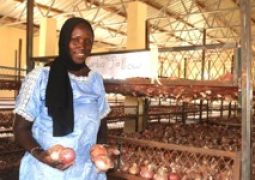The training, which starts from 14 – 18 April, 2025, has drawn 31 participants as policy makers, trainers and quality assurance managers coming from across Nigeria, representing stakeholders from the relevant federal ministries, departments and agencies (MDAs), awarding and professional bodies and a cross-section of federal and state technical universities, among a host of others.
The training is designed to equip trainers with the requisite skills and methodologies to assess and certify individuals based on their prior learning experiences and ensuring full alignment with the national qualification framework.
Hon. Ousman Sillah, Secretary General of the Sub-Saharan Africa Skills and Apprenticeship Stakeholders Network (SASASNET), is attending the event as the Rapporteur General and one of the facilitators of this national capacity building programme. The training is conducted by two internationally certified trainers or consultants on RPL in the persons of Dr. Kaylash Allgoo, SASASNET Country Focal Person (CFP) for Mauritius and Lead Trainer, and Architect Nyamai Wambua, Deputy SASASNET Focal Person (CFP) for Kenya and CEO, Kenya National Federation of Jua Kali.
Addressing the opening ceremony, Prof. Idris Muhammad Bugaje, Executive Secretary of NBTE, who also doubles as the founding Continental Chairperson of SASASNET, described RPL as “a low hanging fruit that can be taken advantage of especially in Nigeria where 75 percent of the workforce are in the informal economy”.
She said the informal workforce in some other African countries is 85 percent or above, adding that RPL seeks to formalise the informal sector to enable the skills persons to know their levels of competence through the process of assessment and certification.
Prof. Bugaje hailed the Federal Ministry of Education in its efforts and drive to rebrand TVET in Nigeria to ensure its vitality in propelling industrialisation and economic development. He added that the efforts to invest in skills development and in making history ‘the broken window syndrome’, which depicts the neglect of TVET facilities, are highly welcome.
NBTE Executive Secretary said industries can only be found in two states in Nigeria when the potential and latent talent exist for the country to industrialised, citing the Lagos Ikeja Computer Village and other places in the country where real innovation and production of quality products are taking place.
Speaking earlier, Hon. Ousman Sillah underscored the importance of this national capacity building for trainers and quality assurance managers in Nigeria, which he said, is facilitated by SASASNET in collaboration with NBTE to be paraded as a model for member countries to emulate.
“This collaboration is part of the mandate of SASASNET to build-up a pool of resource persons, experts or consultants from amongst its membership to be deployed to conduct capacity building in our areas of interest and on the request of member countries,” he said.
“If we are interested in building a productive workforce, eradicating poverty, creating employment, promoting sustainable development, we need not look any further or resort to anything but to support skills and apprenticeship development.” He added that “this is what RPL is coming to do to help us recognise the competencies and quality assure the skills of the informal sector workforce.”
Mrs. Jamila Muhamed, Principal Assistant (PA) to the Federal Minister of Education, deputising the minister, welcomed the participants and resource persons to what she described as a “ground-breaking event”. She expressed the commitment of government in revolutionising skills development in Nigeria.
“The government is fully committed to this initiative and that we want this to be the start of formalising the informal sector in Nigeria,” she said. She added that this show of commitment should also sprinkle down to the implementers as well.
Dr. Kaylash Allgoo is an international consultant in education and training and has over the past 30 years served in various senior leadership capacities. Following the years spent in the private sector, he went over to the Technical, Vocational, Educational and Training (TVET) sector where he has served as CEO of the Mauritius Qualifications Authority, the regulatory body of TVET sector from 2006 to 2014.
Architect Nyamai Wambua from Kenya, is a trained Architect, a graduate from the School of Architecture and Building Sciences of the Jomo Kenya University of Agriculture and Technology (JKUAT) and a member of the Architectural Association of Kenya (AAK). An International Labour Organization (ILO) certified Recognition of Prior Learning (RPL) and Quality Apprenticeships Expert, Mr. Pascal Durrand is an international expert from the Agence Francaise de Developpement (AFD) of the French Government, who is providing technical assistance to NBTE and SASASNET Secretariat in Abuja.




